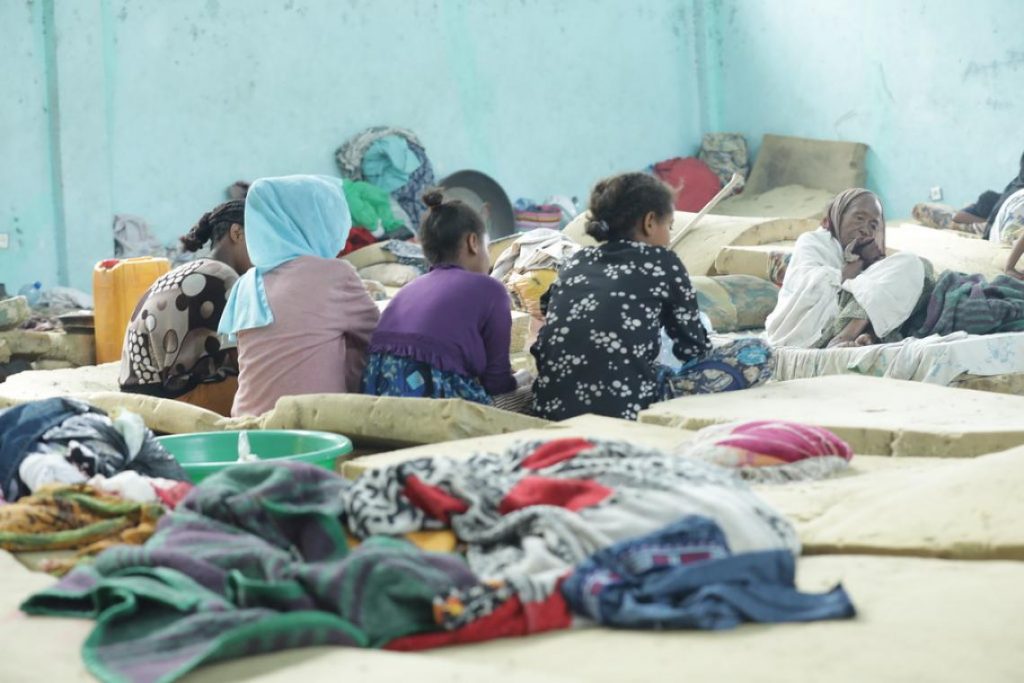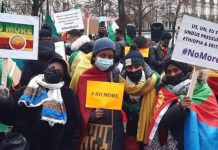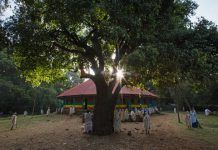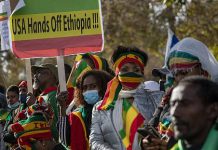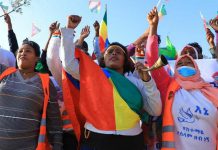Africa-Press-Ethiopia
The conflict that has spread across five woredas (districts) of the North Shewa Zone of the Amhara region in March displaced 246,000 people, according to the Zone Disaster Prevention and Food Security Programme Coordination Office. So far, 210,000 people have returned to their homes, while the rest are still staying in shelters and with host communities.
Hana and her grandparents are sharing a shelter in the town of Shewa Robit, along with hundreds of other people who have gone through a similar situation.
“I make coffee for my grandmother here [inside the shelter],” says Hana pointing to an old kettle and a charcoal stove scattered in a corner with some other utensils. “I also cook our daily meal.”
The rest of the day, she tries to mingle with other girls of her age. Hana who is ‘active and outgoing’ in school, appears timid and is clearly struggling to cope with the trauma she has lived through.
“The conflict has its toll on women and children,” says Selamawit Eshetu, head of the woreda Women and Children Affairs Office. “We are trying our best to help them not only with their daily needs but also, by providing psychosocial support.”
Mulu Admasu, a mother of three girls, says that she worries about her children’s future. She was forced to leave behind a farm full of produce. “We were self-sufficient, my husband is a hard-working farmer. We produced peanuts, sorghum teff and mung bean. All that is gone,” she says.
“I sometimes find it hard to explain this situation to my children. Especially to my youngest child who is only 6. Every time she hears a loud sound, she thinks it is a gunshot.” Her two older daughters quit school because of the conflict.
In conflict and disaster, children and women suffer first and suffer most.
According to the Internal Displacement Monitoring Centre (IDMC), in 2020, conflict and disasters triggered 40.5 million new internal displacements across 149 countries and territories, including Ethiopia1.
In North Shewa Zone, UNICEF with support from Swedish International Development Cooperation Agency (SIDA), is working closely with the regional government by providing critical life-saving support such as emergency medicines, therapeutic food, hygiene supplies and tents.
With UNICEF’s support, 31 social workers, including 11 women, have been trained and deployed in 25 kebeles (sub districts) and 5 woredas (districts). They ensure that displaced children and women who are at risk of exploitation, violence, psychosocial distress, abuse, and gender-based violence receive services.
The social workers also identify vulnerable children with diverse needs, manage their cases and link them to available services.
“I am so happy that I started working here at a critical time when our support is most needed,” says Meron Abeje, a social worker. “These people have gone through a lot and it is not easy to get over such a trauma easily. Many have lost loved ones, their property and livelihood.”
“I SOMETIMES FIND IT HARD TO EXPLAIN THIS SITUATION TO MY CHILDREN. ESPECIALLY TO MY YOUNGEST CHILD WHO IS ONLY 6. EVERY TIME SHE HEARS A LOUD SOUND, SHE THINKS IT IS A GUNSHOT.”
MULU ADMASU, A MOTHER OF THREE GIRLS
“We go house to house and, in the shelters, to identify their needs,” adds Samrawit Alemu, a Child Protection Officer at the woreda. “Our support includes family tracing and reunification of separated children, and compiling detail needs assessment information so that it is easier for NGOs and other organizations to provide support.”
Hana is not sure when she will be returning to her village. “I think about my home, my friends and my school. I know that some of my friends are staying in town renting a house. I wish to see them again,” she says.
One thing she is worried about is her education. Last year the COVID-19 pandemic affected her studies and this year, a conflict. Despite all this, she is looking forward to continuing her education. Her dream is to become a doctor. UNICEF

